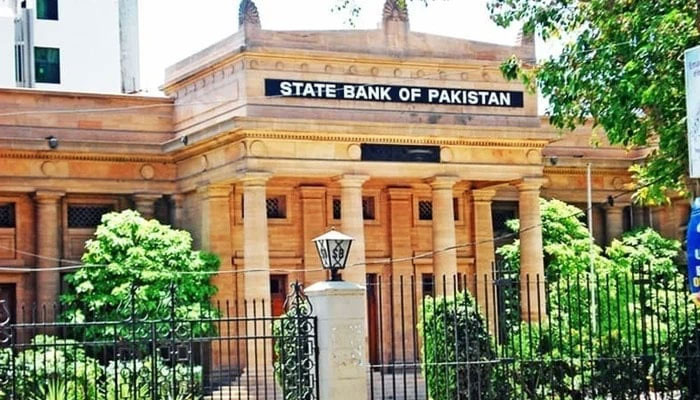Maintaining the status quo
Central bank anticipates that inflation will continue to accelerate before stabilising within its target range of 5-7% in FY26
In a largely predictable move, the State Bank of Pakistan has maintained its interest rates at 11 per cent. Officials believe that the ongoing unrest between Israel and Iran could result in an uptick in inflation. Any rise in oil prices could deliver a significant blow to the Pakistani economy, which has a large fuel import bill. The decision to maintain the status quo is taken to protect Pakistan from once again getting stuck in a whirlpool of high import bills and a destabilised economy. Inflation in May rose to 3.5 per cent against the expected 2.7 per cent, driven by a surge in food prices. The central bank also anticipates that inflation will continue to accelerate before stabilising within its target range of 5-7 per cent in FY26. But, it adds that this outlook remains subject to multiple risks emanating from potential supply-chain disruptions from regional geopolitical conflicts, volatility in oil and other commodity prices, and the timing and magnitude of domestic energy price adjustments. Earlier, analysts had already expected that the SBP would pause its rate cuts, given external pressures.
The business community has expressed disappointment over the SBP’s decision, arguing that the high cost of doing business will hurt reaching the country’s ambitious growth target of 4.2 per cent in FY26. They also note that, given the rate of inflation has come down significantly, high interest rates do not seem viable. Industry insiders believe that this move will end up reversing industrial recovery. Experts have often complained that an unfavourable business environment has pushed many companies out of Pakistan. In recent years, there has been a visible increase in the number of business owners moving their businesses (or part of it) outside the country. This creates problems for the people here. Also, if a company has high operational costs, it is highly unlikely that it will regularly increase the salaries of its employees, leading to a highly demotivated workforce.
These recent times are a test for the SBP to announce financially viable policies and ensure that Pakistan’s road to recovery is long-term and sustainable. According to experts, the IMF has also advised the country to keep the monetary policy tight. Pakistan’s unbridled consumption habits have already brought the country to the brink of default once in very recent times. We cannot afford a replay of those days. But ignoring the demands of industry insiders is also not a good option. Our economic turnaround, as acknowledged by foreign economic commentators, is a miracle, and we must realise that we cannot get second chances. SBP officials and industry stakeholders need to come up with a joint strategy to move the economy forward.
-
 What You Need To Know About Ischemic Stroke
What You Need To Know About Ischemic Stroke -
 Shocking Reason Behind Type 2 Diabetes Revealed By Scientists
Shocking Reason Behind Type 2 Diabetes Revealed By Scientists -
 SpaceX Cleared For NASA Crew-12 Launch After Falcon 9 Review
SpaceX Cleared For NASA Crew-12 Launch After Falcon 9 Review -
 Meghan Markle Gives Old Hollywood Vibes In New Photos At Glitzy Event
Meghan Markle Gives Old Hollywood Vibes In New Photos At Glitzy Event -
 Simple 'finger Test' Unveils Lung Cancer Diagnosis
Simple 'finger Test' Unveils Lung Cancer Diagnosis -
 Groundbreaking Treatment For Sepsis Emerges In New Study
Groundbreaking Treatment For Sepsis Emerges In New Study -
 Roblox Blocked In Egypt Sparks Debate Over Child Safety And Digital Access
Roblox Blocked In Egypt Sparks Debate Over Child Safety And Digital Access -
 Savannah Guthrie Addresses Ransom Demands Made By Her Mother Nancy's Kidnappers
Savannah Guthrie Addresses Ransom Demands Made By Her Mother Nancy's Kidnappers -
 OpenAI Reportedly Working On AI-powered Earbuds As First Hardware Product
OpenAI Reportedly Working On AI-powered Earbuds As First Hardware Product -
 Andrew, Sarah Ferguson Refuse King Charles Request: 'Raising Eyebrows Inside Palace'
Andrew, Sarah Ferguson Refuse King Charles Request: 'Raising Eyebrows Inside Palace' -
 Adam Sandler Reveals How Tom Cruise Introduced Him To Paul Thomas Anderson
Adam Sandler Reveals How Tom Cruise Introduced Him To Paul Thomas Anderson -
 Washington Post CEO William Lewis Resigns After Sweeping Layoffs
Washington Post CEO William Lewis Resigns After Sweeping Layoffs -
 North Korea To Hold 9th Workers’ Party Congress In Late February
North Korea To Hold 9th Workers’ Party Congress In Late February -
 All You Need To Know Guide To Rosacea
All You Need To Know Guide To Rosacea -
 Princess Diana's Brother 'handed Over' Althorp House To Marion And Her Family
Princess Diana's Brother 'handed Over' Althorp House To Marion And Her Family -
 Trump Mobile T1 Phone Resurfaces With New Specs, Higher Price
Trump Mobile T1 Phone Resurfaces With New Specs, Higher Price




